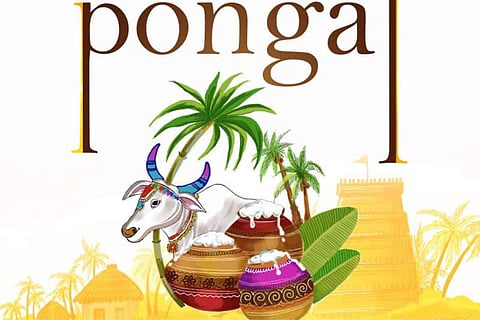
- LIFESTYLE
- FASHION
- FOOD
- ENTERTAINMENT
- EVENTS
- CULTURE
- VIDEOS
- WEB STORIES
- GALLERIES
- GADGETS
- CAR & BIKE
- SOCIETY
- TRAVEL
- NORTH EAST
- INDULGE CONNECT

Pongal, the vibrant and auspicious harvesting festival, is a cultural extravaganza celebrated with immense significance in Tamil Nadu, India. Falling every January during the Tai month of the Tamil Solar calendar, Pongal spans four days, commencing on January 15 and concluding on January 18. Dedicated to the Sun God (Lord Surya), Pongal heralds the beginning of Uttarayan, symbolising the sun’s transition into the Capricorn zodiac, marking the end of winter and the onset of the harvest season. As a festival that binds communities, Pongal is celebrated with diverse rituals and traditions.
The festival unfolds with Bhogi Pongal on the first day, followed by Surya Pongal on January 16, Mattu Pongal on January 17, and Kannam Pongal on January 18. Named after the traditional dish prepared during this festive period, Pongal is a special rice dish made with freshly harvested crops, milk, and jaggery.
Bhogi Pongal, the festival’s kickoff, witnesses the symbolic burning of bonfires to dispel negativity and mark new beginnings. Homes are deep-cleaned, and adorned with flowers, diyas, lights, and Kolam. A special Pongal dish, a delightful blend of freshly harvested rice, jaggery, and milk, is prepared to mark this day.
Surya Pongal, the second day, is dedicated to expressing gratitude to Lord Surya for his blessings. Devotees offer prayers at sunrise, accompanied by the preparation of Pongal as a sacred offering. Mattu Pongal venerates cattle as sacred, with cows adorned with bells, colourful beads, and flower garlands. Farmers, pivotal to the harvest, are celebrated for their relentless efforts.
On the final day, Kannam Pongal, families unite to revel in the festivities, sharing love, laughter, and warmth. Traditionally, people visit relatives, exchange gifts, engage in traditional games, dance to folk songs, and express gratitude for the bounties of nature.
Various traditions enrich Pongal, including making Kolams to welcome Goddess Lakshmi, discarding old items, decorating puja houses, cooking Pongal in clay pots or stoves, and tying manjal kothu around the pot. Traditional attire plays a crucial role, with men donning kurta, dhoti, and angavastram, while women adorn vibrant silk saris.
At the heart of Pongal is the celebration of rice. Sakkarai Pongal, a sweet version made with rice, moong dal, ghee, cashews, raisins, and jaggery, and Ven Pongal, a spicy counterpart enriched with ghee, pepper, and cumin, stand as culinary symbols of this harvest festival's joy and abundance. Pongal weaves together diverse traditions, delectable feasts, and the spirit of unity, making it a cherished cultural spectacle.